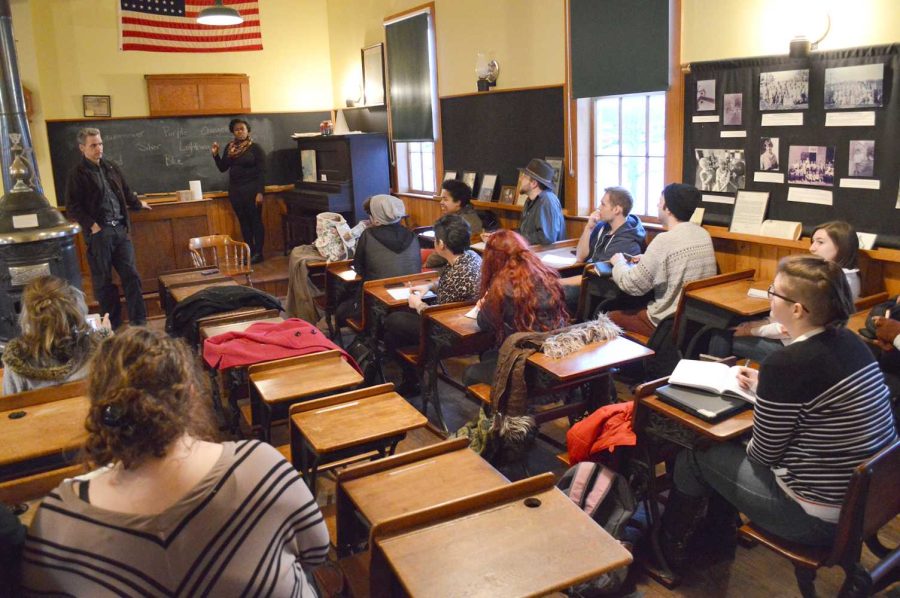Students gathered in the Little Red Schoolhouse Monday night, reading poetry from notebooks, laptops and smartphones among 19th century desks and pictures.
The students were members of Spoken Performance for Empowerment, Action and Knowledge [SPEAK], a student group for writing and reading poetry.
The group was founded two years ago and officially recognized by the University a year ago.
Tim Murnen, a professor in the School of Teaching and Learning, aided students Breshea Anglen and Kat Virostko in starting the group.
Senior Catherine Lautar was also one of the founding members of SPEAK. She died in a car crash in January.
Murnen said Lautar played a big role in getting SPEAK started.
“Last year, it wasn’t a roomful of people, it was me, [Virostko] and [Lautar],” Murnen said. “[Lautar] was instrumental in pulling things together.”
Virostko, a senior and secretary for SPEAK, said the organization originated from a desire for a place to explore social issues and students’ personal takes on those issues through spoken word poetry.
“There wasn’t a space for that here, so we made our own space for it,”
she said.
Anglen, president of SPEAK, agreed that a main reason for starting SPEAK was the need for a spoken word poetry group. She said that poetry can have an impact in people’s lives.
“It helps people get through the tough things in their life. It provides people with a voice that they wouldn’t have if they weren’t doing poetry,” Anglen said. “I wanted to make that space for people.”
Murnen said that the inspiration for SPEAK came from his and Anglen’s discussion of “what it would mean to be … high school teachers who didn’t just have students read old, dead poetry, but wrote their own and made it come to life.”
SPEAK is a way to model that for students, he said.
At the meeting, members first wrote poems in response to a prompt, then read they wrote out loud. After, there was time to share poems written outside of the meeting and receive feedback.
The poems ranged from funny to emotional to political and covered personal and national issues.
Murnen said his favorite part of SPEAK is seeing students find their voices.
“Every week someone new walks in this room, who has never read a poem out loud, who never tried slam or performance poetry,” he said.
He said that after being a part of the organization, “they become empowered to continue to speak.”
Senior Christina Green shared a poem for the first time at Monday’s meeting, though she had attended several previous
meetings.
She said she was introduced to SPEAK through a mutual friend with Anglen, but stayed for the community.
“It’s really nice to be around people who appreciate what you’re doing,” she said.
Both Virostko and Anglen emphasized that SPEAK was a place students could feel safe.
“It’s a place to speak out, it’s a place to talk about things that our bothering me, things that are important to me; it’s a safe place,” Virostko said.
“I’ve had a lot of people come up to be and tell me that SPEAK helped them be themselves,” Anglen said. “We have a lot of people here who wouldn’t be able to be themselves anywhere else.”














